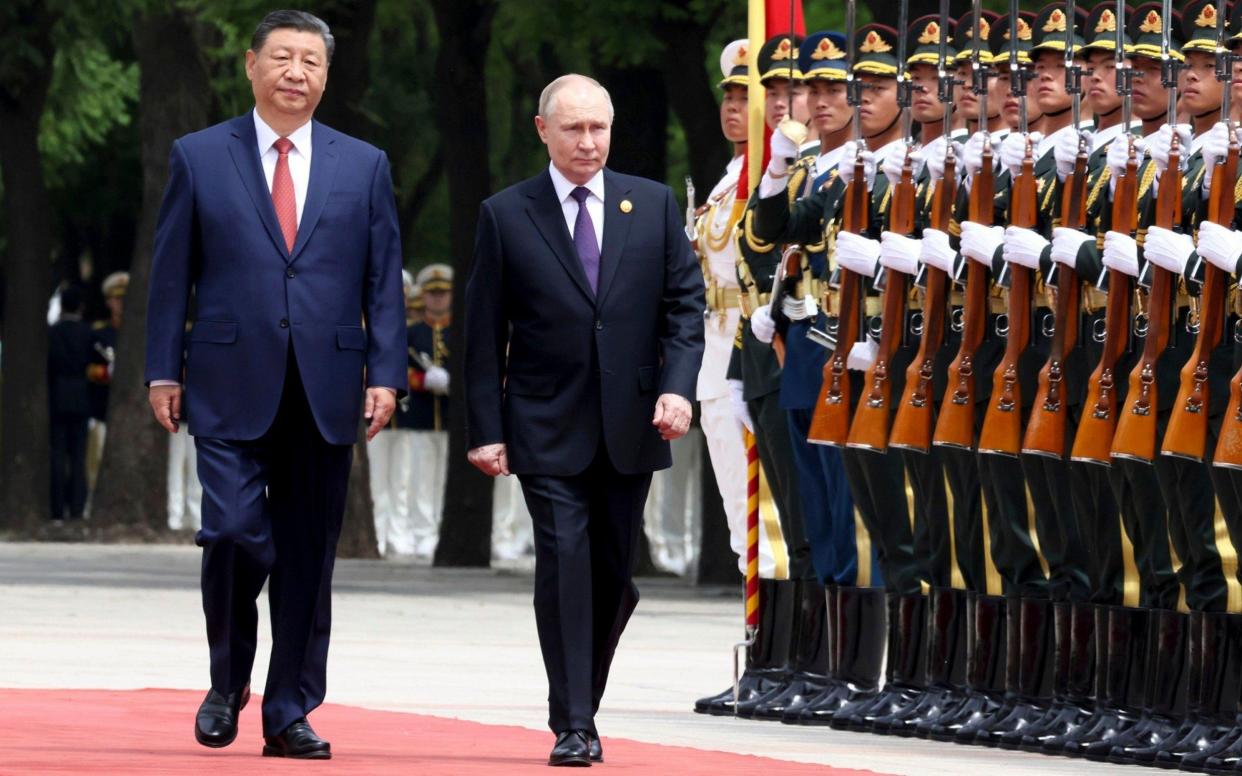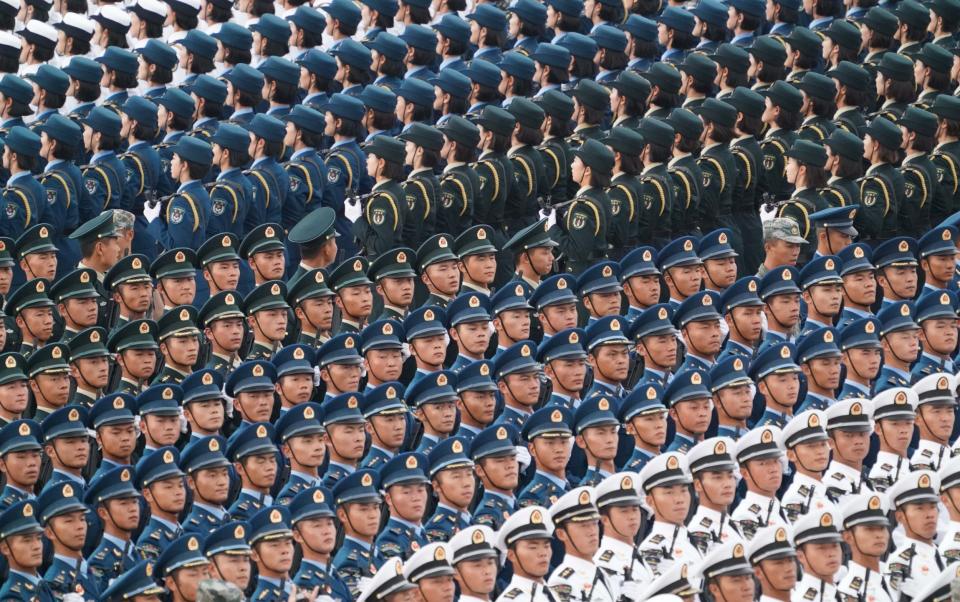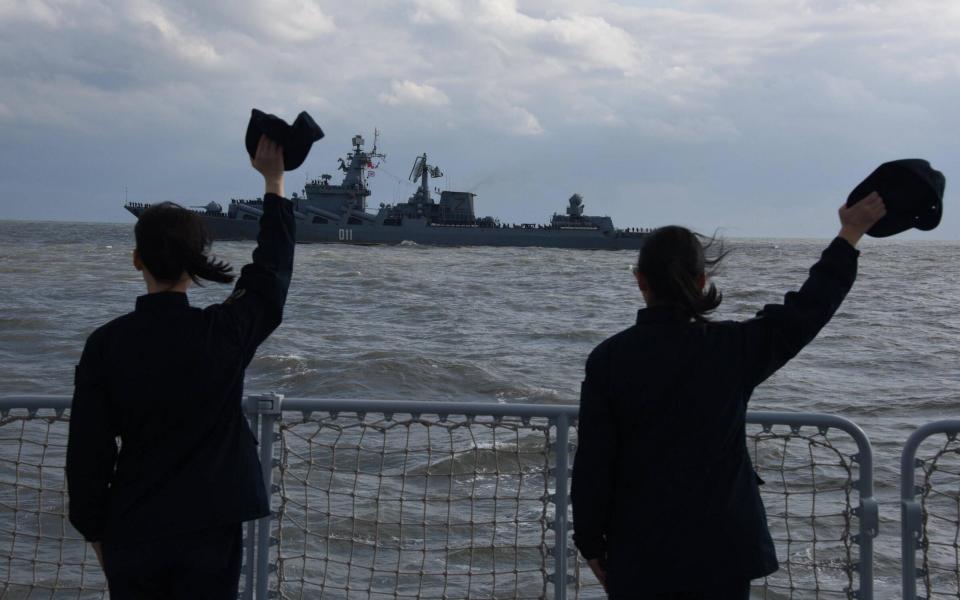Putin and Xi hail ‘deepening’ military ties

- Oops!Something went wrong.Please try again later.
- Oops!Something went wrong.Please try again later.
Vladimir Putin and Xi Jinping have agreed to deepen their co-operation on defence and hold more joint military drills after the Russian president arrived in Beijing for an opulent state visit.
Putin was met by his Chinese counterpart with full military honours, a band playing Soviet songs and cheering children in a grand ceremony at the Great Hall of the People in central Beijing on Thursday.
The visit cemented the bond that has grown between the two autocratic leaders as China provides goods to prop up Russia’s war machine amid the conflict in Ukraine.
Since declaring a “no-limits” relationship in 2022, both men have made clear their determination to work together to reshape the US-led democratic order.
As he met his Russian counterpart, Mr Xi underscored that the two nations were thriving as “good neighbours, good friends [and] good partners”, while Putin said he chose China for his first trip abroad after being inaugurated to a fifth term in office to stress the “unprecedented” depth of their ties.
Condemning what they cast as increasingly aggressive US behaviour against their countries’ interests, they signed a 7,000-word joint statement on “the deepening of the comprehensive partnership and strategic co-operation entering a new era”.
The agreement covered co-operation on a wide range of issues, from economics and space to foreign policy positions on Ukraine and Taiwan.
“The parties reiterate their serious concern over the attempts of the United States to disrupt the strategic security balance in the region,” a Russian version of the document said, highlighting concerns about US missile defence capabilities.
Quid pro quo
It also specified how Russian-Chinese co-operation would improve regional and global security, committing to the expansion of joint military drills which have already become a staple of their bilateral relationship.
Combined war games, including naval drills and patrols by long-range bombers over the Sea of Japan, and ground force exercises on each other’s territory have alarmed the US, prompting the Pentagon to begin redrawing its own defence strategy in the potentially volatile Indo-Pacific region.
In early May, US defence officials warned the US Senate Armed Services Committee over Chinese and Russian joint military drills in the East China Sea near Taiwan.
In what appears to be a quid pro quo move for Mr Xi’s political support since Moscow’s invasion of Ukraine, Putin has repeatedly embraced China’s territorial claims over democratic Taiwan, which Beijing has threatened to seize by force if necessary.

In a press conference on Thursday afternoon, and before they attended a celebratory concert to mark the 75th anniversary of formal China-Russia relations followed by an informal dinner, Putin said he was “grateful” for China’s efforts in trying to find a solution to the war in Ukraine.
Mr Xi doubled down on Beijing’s support for Moscow, stating the “hard-earned” relationship should be cherished and that China was ready to “jointly achieve the development and rejuvenation of our respective countries, and work together to uphold fairness and justice in the world.”
In doing so, he indicated he would resist pressure from the West to downgrade China’s ties with Russia.
In April, the US accused Beijing of being the “top supplier” to Moscow of machine tools, microelectronics, nitrocellulose and other items it considered to be of “dual use” for civilian and military purposes.
According to data compiled by The Economist, China’s export to Russia of ball bearings, which are used in the manufacture of tanks, surged by nearly 170 per cent last year compared to the same period in 2021.
“Russia would struggle to sustain its assault on Ukraine without China’s support,” Antony Blinken, the US Secretary of State, said during a visit to Beijing in April, where he cautioned that the US would take action if China did not curb the flow of goods.
Western capitals have also objected to China throwing an economic lifeline to the Kremlin, undermining tough international sanctions in response to the Ukraine war.
‘A lot of self-confidence’
Last year, two-way trade hit a record $240.1 billion (£189 billion), growing by 64 per cent since 2021, with Beijing becoming a key exporter of cars, clothing and other raw materials to Russia.
China is also a major importer of energy supplies that keep the Kremlin’s coffers full.
The attendance of Alexander Novak, a top official for Russian oil and gas, raised expectations that Putin would broach the issue of the Power of Siberia 2, a natural gas pipeline designed to connect Russia and China via Mongolia.

The Russian president has long sought to cement an agreement on the project which would divert 50 billion cubic metres of natural gas per year to northern China - redirecting a supply that once went to Europe.
Beijing residents told AFP they thought highly of Putin.
“I think he shows a lot of self-confidence and I get the impression that he likes to exercise and take care of his body,” said 30-year-old financial worker Keira Che.
“In short, he’s someone who is charismatic,” she said, adding that she hoped the visit would further boost trade.
Ms Che added: “For normal people, you know, economic issues are always the most important.
“It could improve people’s lives, especially those of the Chinese who live near Russia.”

